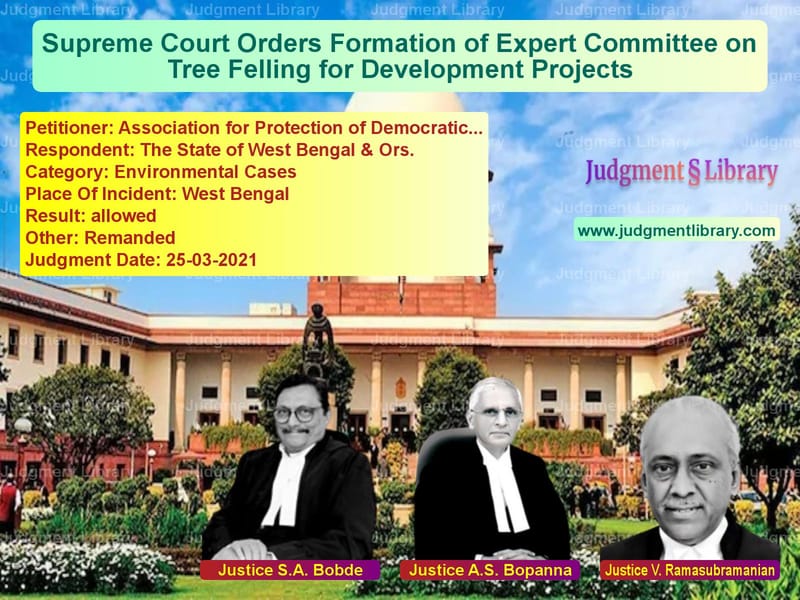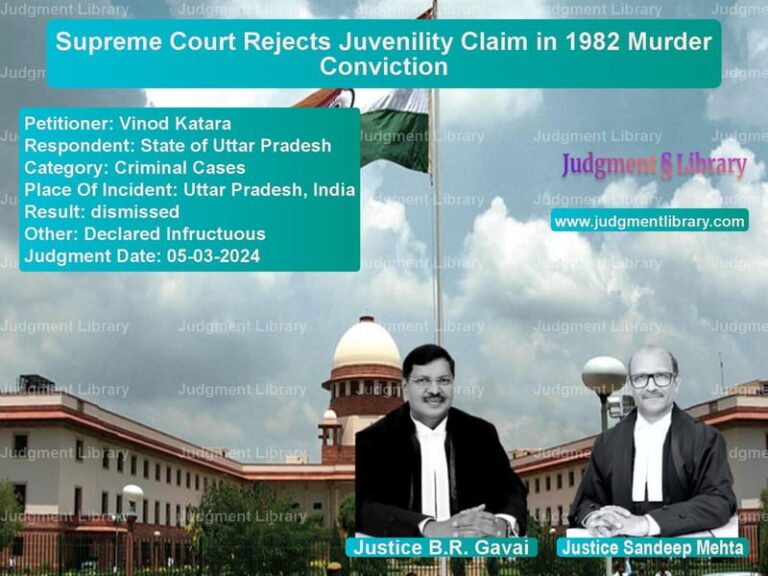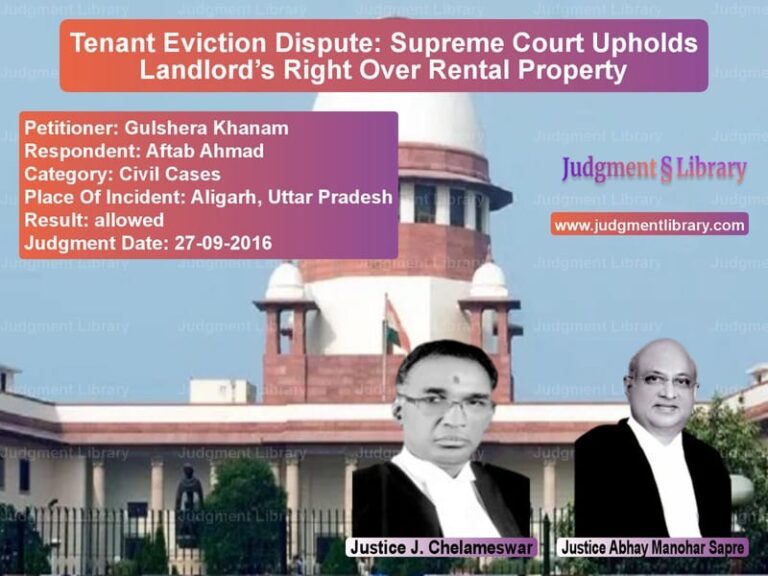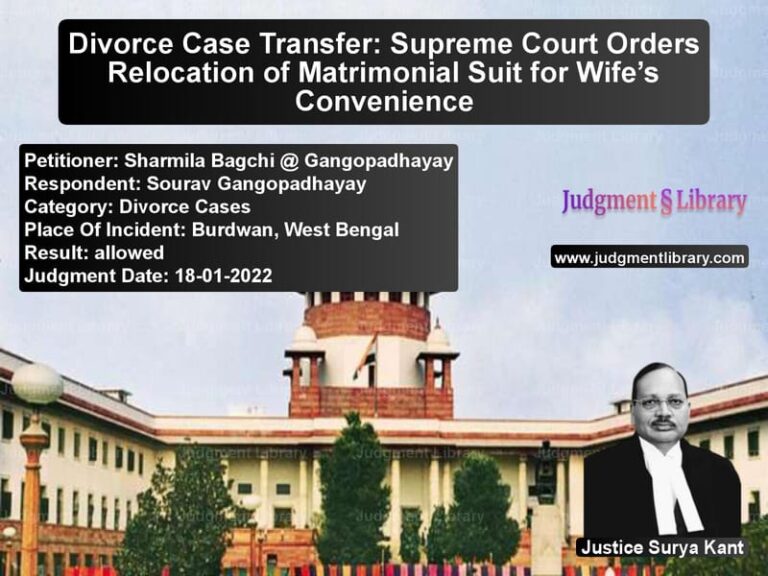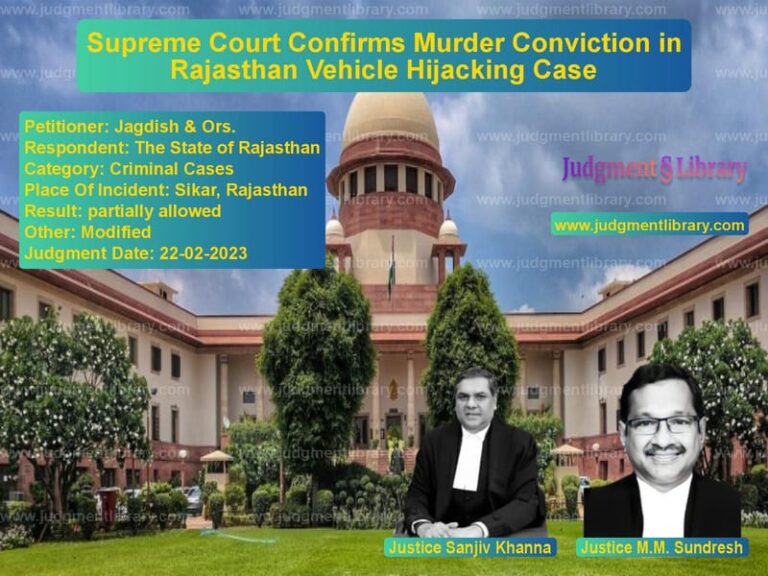Supreme Court Orders Formation of Expert Committee on Tree Felling for Development Projects
The Supreme Court of India, in the case of Association for Protection of Democratic Rights & Anr. v. The State of West Bengal & Ors., addressed the critical issue of balancing environmental conservation with infrastructure development. The case revolved around whether the West Bengal government should be permitted to cut trees, some over 150 years old, to construct Road Over Bridges (ROBs) and widen roads to prevent accidents.
Background of the Case
The dispute arose from the West Bengal government’s infrastructure expansion plans, which required the felling of approximately 356 trees, including some with historical and ecological significance. The government justified the project on the grounds of public safety, citing frequent accidents at railway crossings where the ROBs were planned.
The petitioners, environmental activists, and local citizens challenged the proposal, arguing that compensatory afforestation could not replace the invaluable environmental benefits provided by century-old trees.
Petitioners’ Arguments (Association for Protection of Democratic Rights)
The petitioners contended:
- The trees, some over 150 years old, provided irreplaceable ecological benefits such as oxygen production, carbon sequestration, and biodiversity support.
- Compensatory afforestation could not substitute for the loss of such old trees.
- The right to a clean and healthy environment is a fundamental right under Article 21 of the Constitution.
- India is a signatory to international agreements that commit to sustainable development, and the project contradicts these commitments.
Respondents’ Arguments (State of West Bengal)
The State defended the project, stating:
- The construction of ROBs was necessary to prevent accidents and protect human lives.
- Infrastructure development is equally important as environmental conservation.
- All environmental guidelines, including compensatory afforestation, would be followed.
- The project was aligned with India’s National Action Plan on Climate Change (NAPCC), which promotes increased tree cover.
Supreme Court’s Observations
A bench comprising Chief Justice S.A. Bobde, Justice A.S. Bopanna, and Justice V. Ramasubramanian examined the balance between development and conservation. The Court made several key observations:
1. Conservation and Development Must Coexist
“Conservation of nature must be viewed as part of development and not as a factor stultifying development.”
The Court emphasized that infrastructure projects should integrate conservation principles rather than treat them as obstacles.
2. Compensation for Tree Felling Must Reflect Ecological Value
“The economic value of a tree must be assessed not just for its timber but also for its oxygen production, carbon sequestration, and habitat support.”
The Court directed that compensation for tree felling must include environmental and ecosystem costs, not just the market price of wood.
3. India’s Climate Commitments
“India has committed to increasing forest and tree cover from 23% to 33% under the Paris Agreement and the Nationally Determined Contributions (NDCs).”
The Court reinforced that development projects must align with India’s international climate commitments.
4. Formation of an Expert Committee
“An expert committee shall develop a scientific framework for assessing the environmental cost of tree felling and prescribe guidelines for future projects.”
The Court ordered the formation of an expert committee to guide decision-making on tree felling for development projects.
Supreme Court’s Verdict
The Supreme Court ruled as follows:
- An Expert Committee was constituted to recommend policy guidelines for tree felling in infrastructure projects.
- The Committee was directed to submit its report within four weeks from its first meeting.
- The Union of India was directed to provide administrative support to the Committee.
- The Court appointed Advocate K. Parameshwar as amicus curiae to assist the Committee on legal aspects.
Composition of the Expert Committee
The Court appointed the following experts:
- Dr. M.K. Ranjitsinh Jhala (Wildlife Expert, former Chairman of the Wildlife Trust of India) – Chairperson.
- Jigmet Takpa (Joint Secretary, Ministry of Environment, Forests and Climate Change) – Member Secretary.
- Arun Singh Rawat (Director General, Indian Council for Forestry Research) – Member.
- Prof. Sandeep Tambe (Forestry Professor, Indian Institute of Forest Management, Bhopal) – Member.
- Gopal Singh Rawat (Former Dean, Wildlife Institute of India) – Member.
- Dr. Nilanjan Ghosh (Director, Observer Research Foundation, Kolkata) – Member.
- Pradeep Krishen (Environmentalist) – Member.
Mandate of the Expert Committee
The Committee was tasked with:
- Developing scientific and policy guidelines on tree felling.
- Classifying trees based on environmental value, age, and girth.
- Recommending compensation mechanisms, including ecosystem service valuation.
- Assessing alternative routes and modes of transport to minimize tree loss.
- Prescribing compensatory afforestation methods that align with local ecosystems.
Impact of the Judgment
This ruling has several significant implications:
- Establishes a scientific approach to tree valuation in development projects.
- Ensures fair compensation for environmental loss.
- Encourages infrastructure planning that minimizes ecological damage.
- Strengthens India’s commitment to sustainable development.
Conclusion
The Supreme Court’s judgment sets a precedent for balancing development and environmental protection. By forming an expert committee, the ruling ensures that future infrastructure projects in India are planned with scientific rigor and environmental sustainability. The decision reinforces that development must not come at the cost of ecological degradation but should integrate conservation strategies to ensure long-term environmental benefits.
Petitioner Name: Association for Protection of Democratic Rights & Anr..Respondent Name: The State of West Bengal & Ors..Judgment By: Justice S.A. Bobde, Justice A.S. Bopanna, Justice V. Ramasubramanian.Place Of Incident: West Bengal.Judgment Date: 25-03-2021.
Don’t miss out on the full details! Download the complete judgment in PDF format below and gain valuable insights instantly!
Download Judgment: association-for-prot-vs-the-state-of-west-be-supreme-court-of-india-judgment-dated-25-03-2021.pdf
Directly Download Judgment: Directly download this Judgment
See all petitions in Public Interest Litigation
See all petitions in Environmental Cases
See all petitions in Fundamental Rights
See all petitions in Judgment by S. A. Bobde
See all petitions in Judgment by A. S. Bopanna
See all petitions in Judgment by V. Ramasubramanian
See all petitions in allowed
See all petitions in Remanded
See all petitions in supreme court of India judgments March 2021
See all petitions in 2021 judgments
See all posts in Environmental Cases Category
See all allowed petitions in Environmental Cases Category
See all Dismissed petitions in Environmental Cases Category
See all partially allowed petitions in Environmental Cases Category

